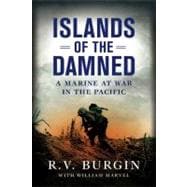
| Prologue Luck | p. 1 |
| A Marine's Story | p. 19 |
| Mortarman | p. 33 |
| Green Hell | p. 63 |
| First Battle of Pavuvu | p. 95 |
| The Unnecessary Island | p. 125 |
| The Perfect Invasion | p. 153 |
| Second Battle of Pavuvu | p. 187 |
| April Fools | p. 209 |
| Flesh Wounds | p. 237 |
| Home Port | p. 269 |
| Selected Bibliography | p. 287 |
| Index | p. 291 |
| Table of Contents provided by Ingram. All Rights Reserved. |
The New copy of this book will include any supplemental materials advertised. Please check the title of the book to determine if it should include any access cards, study guides, lab manuals, CDs, etc.
The Used, Rental and eBook copies of this book are not guaranteed to include any supplemental materials. Typically, only the book itself is included. This is true even if the title states it includes any access cards, study guides, lab manuals, CDs, etc.
Motors were gunning, pumping out stinking clouds of blue smoke when we climbed down the ladder into the cramped hold. After a morning up top washed by a steady sea breeze, our eyes burned. Below, it was close and hot as hell. We were burdened with combat packs, carbines, sidearms, first aid kits, KA-BAR knives, two canteens each, struggling to keep a foothold on the pitching deck.
I believed I was going to come back in one piece. There were guys I knew, Marines I fought alongside, who got a feeling their time was up. Once they got it you couldn’t talk them out of it. When we had been fighting to hang on to Walt’s Ridge on New Britain, Lonnie Howard said, “Burgin, if anything happens to me, I want you to take my watch.”
“You’re crazy,” I told him. “You’ll be okay. Nothing’s going to happen to you.”
That night one of our artillery shells hit nearby. The shrapnel killed Howard and another Marine, Robert McCarthy.
Me, I was anxious and wary that morning off Peleliu. But I never thought for a minute I wouldn’t make it.
[We were in] one of the older amtracs, the ones without a drop-down back end. When we rolled up on the beach we’d have to scramble over the sides. That’s when the Japs would have a clear shot at us.
There were about twenty of us, plus the driver, probably a Navy man, all jammed together like toes in a shoe. While we waited, sailors topside looked us over, giving us the thumbs-up and shouting encouragement that we couldn’t hear over the noise. Finally the big clamshell doors of that LST—Landing Ship, Tank—cranked open. Number 13 shuddered, and we followed the other amtracs down the ramp, nosed into the water, and floated out into the bright morning sun.
It was a little past eight o’clock.
An amtrac at sea wallows like a buffalo. The flat-bottomed Higgins boats could do twelve knots. We barely managed four and a half, which is about as fast as a man can walk. Think of us walking to shore under fire. We circled for half an hour until the beach master dropped his red flag, the signal to form up and head for shore. Our battleships and cruisers had been working over the island since dawn, guns cracking like thunder. They paused long enough for the Dauntless dive bombers and TBMs to sweep in and dump their bombs. Then they started up again. After our wave got under way, a couple LSTs that were parked out on our flanks sent swarms of rockets screeching over our heads. I’d never heard a sound like that before. Something like cloth ripping. A curtain of black smoke hung over the whole beach. It looked like the island was on fire.
Somewhere along our way in Jap artillery found the range and started working us over. The last thousand yards we were under fire the whole way. Over the general racket I couldn’t hear bullets dinging Number 13, but we kept our heads down anyway. Shells were smacking the water all around us, raising big spikes of foam. Here and there other LSTs and Higgins boats would disappear in a roar of flame. The first bodies floated by. We’d see many more.
About seven hundred yards out, [our amtrac] lurched and halted, pitching us into each other. Treads flailed and something went grinding and scraping beneath our hull. We’d struck a reef. Now the Jap shells were landing closer—left, right and behind us. We sat there churning the water, and minutes seemed to drag by, though I’m sure only seconds were passing.
Our sergeant, Johnny Marmet, leaned forward and stuck his .45 in the driver’s face.
“If you don’t get this son of a bitch moving, I’m going to by God shoot you in the head!” he shouted. “We’re sitting ducks out here!”
The driver was pushing and pulling controls, like a mad man trying to rock a car out of the mud. Treads were spinning, kicking up spray. Then something gently lifted us and we were moving again.
The instant we broke free, an explosion ripped the water right in front of us, dousing us with spray.
I made a quick mental calculation. All that time we’d been moving toward the shore, some Jap gunner was watching us, leading his target. When he figured the trajectory of his shell would intersect our path, he fired. The seconds we’d hung up on that reef were just long enough. If we’d been plowing forward we’d have ended up just where he calculated. That shell would have landed in our laps.
None of us talked about it afterward. We were busy with other things. But I honestly believed it then, and I believe it today. That was a God thing that hung us up on that reef.